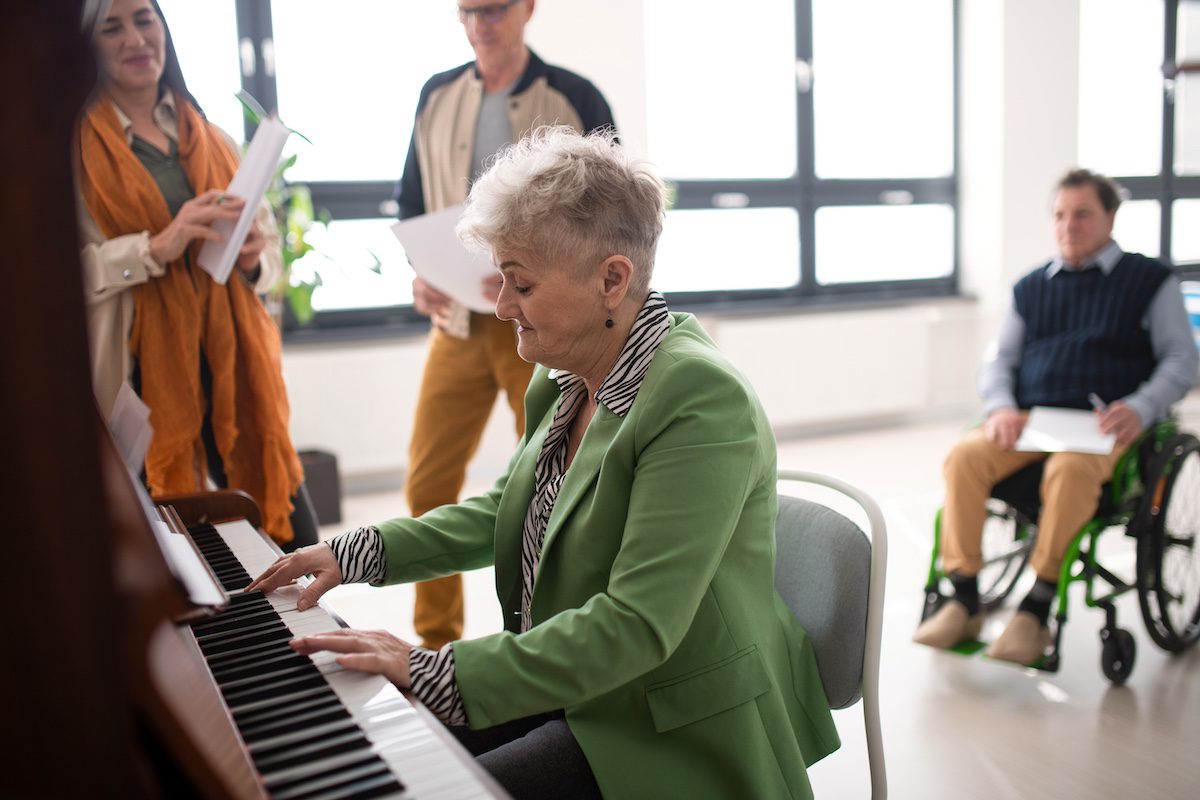Music has a remarkable ability to evoke emotions, spark memories, and uplift spirits. For seniors, music therapy offers a powerful tool for improving overall well-being and quality of life.
Whether through listening, singing, or playing instruments, engaging with music can have profound effects on cognitive, emotional, and physical health. In this blog post, we’ll explore the benefits of music therapy for seniors and how it can enhance their lives in various ways.
Cognitive Stimulation and Memory Enhancement
One of the most notable benefits of music therapy for seniors is its ability to stimulate cognitive function and enhance memory. Research has shown that music activates multiple areas of the brain, including those involved in memory and emotional processing.
For seniors experiencing cognitive decline or memory loss, engaging in musical activities can help preserve cognitive abilities and improve memory recall. Listening to familiar songs from their youth or participating in sing-alongs can evoke memories and provide a sense of comfort and familiarity.
Emotional Well-being and Stress Reduction
Music has a profound impact on emotions, capable of eliciting both joy and tranquility. For seniors, who may face challenges such as loneliness, depression, or anxiety, music therapy offers a therapeutic outlet for expressing emotions and reducing stress.
Listening to calming melodies or participating in group music-making activities can promote relaxation, elevate mood, and foster a sense of emotional well-being. Music has the power to uplift spirits, evoke nostalgia, and provide a source of comfort during difficult times.
Social Connection and Community Engagement
Music has a unique ability to bring people together, fostering social connections and community engagement. For seniors, participating in group music therapy sessions provides an opportunity to interact with others, share experiences, and build meaningful relationships.
Whether through singing in a choir, playing instruments in an ensemble, or attending music appreciation classes, seniors can connect with peers who share similar interests and passions. These social interactions contribute to a sense of belonging and can help combat feelings of isolation and loneliness.
Physical Rehabilitation and Pain Management
In addition to its cognitive and emotional benefits, music therapy can also aid in physical rehabilitation and pain management for seniors. Engaging in rhythmic activities such as drumming or dancing can improve motor skills, coordination, and balance.
For seniors living with chronic pain or undergoing medical treatments, music can serve as a distraction technique, reducing the perception of pain and promoting relaxation.
Music therapy interventions, such as guided imagery with music or relaxation exercises, can also help alleviate symptoms of stress-related conditions and improve overall physical well-being.
Personal Expression and Creativity
For many seniors, music therapy provides a means of personal expression and creativity. Whether through songwriting, improvisation, or exploring different musical genres, seniors can tap into their creative abilities and express themselves in meaningful ways.
Engaging in musical activities allows seniors to explore new interests, rediscover talents, and cultivate a sense of purpose and fulfillment. Music therapy encourages individuals to embrace their unique voices and celebrate the joy of creativity at any age.
Accessible and Versatile
One of the great strengths of music therapy is its accessibility and versatility. It can be adapted to meet the diverse needs and abilities of seniors, regardless of musical background or experience.
Music therapy interventions can be tailored to address specific goals and objectives, whether focused on cognitive stimulation, emotional expression, social interaction, or physical rehabilitation.
Whether in group settings or individual sessions, music therapy can be easily incorporated into senior care programs, assisted living facilities, and community centers.
Incorporating Music into Daily Life
Incorporating music into daily life can have lasting benefits for seniors. Encourage loved ones or caregivers to create personalized playlists of favorite songs, albums, or artists.
Playing background music during daily activities, such as mealtime or relaxation periods, can create a soothing and enjoyable atmosphere. Seniors can also explore music apps, online streaming services, or virtual concerts to discover new music and stay connected to the vibrant world of music.
The Role of Music Therapy in Hospice Care
The role of music therapy in hospice care is multifaceted and deeply impactful, providing comfort, solace, and support to patients and their loved ones during end-of-life journeys.
Music therapy offers a unique avenue for expression and connection, allowing patients to communicate their emotions, fears, and reflections through the universal language of music.
Trained music therapists work closely with hospice teams to assess patients’ needs and develop personalized interventions that address physical, emotional, and spiritual aspects of care.
Whether through live music performances, guided listening sessions, or songwriting activities, music therapy creates opportunities for meaningful moments of connection and reflection, fostering a sense of peace and dignity in the final stages of life.
Moreover, music therapy in hospice care extends beyond the individual patient to encompass the broader hospice community, including family members, caregivers, and staff. Music has the power to unite people and create shared experiences, offering comfort and support to those navigating the complexities of grief and loss.
Music therapy sessions can serve as a space for families to come together, reminisce, and find solace in the beauty of music. Additionally, music therapists collaborate with hospice staff to integrate music into the overall care plan, enhancing the quality of life for patients and promoting a compassionate and holistic approach to end-of-life care.
In this way, music therapy serves as a vital component of the comprehensive support system provided by hospice care teams, enriching the final chapters of life with moments of beauty, connection, and meaning.
Final Thoughts
Music therapy holds tremendous potential for enhancing the well-being of seniors in diverse ways. From stimulating cognitive function and promoting emotional well-being to fostering social connections and encouraging creativity, music offers a holistic approach to senior care.
Whether through listening, singing, or playing instruments, seniors can harness the transformative power of music to enrich their lives and cultivate a sense of joy and fulfillment.
By embracing music therapy as a valuable resource, seniors can embark on a harmonious journey toward greater health, happiness, and vitality. Contact our team for more information on how we include music therapy in our plan of care.



